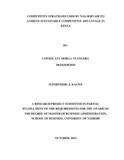| dc.contributor.author | Nyangera, Consolata Moraa | |
| dc.date.accessioned | 2014-12-04T05:44:49Z | |
| dc.date.available | 2014-12-04T05:44:49Z | |
| dc.date.issued | 2014 | |
| dc.identifier.citation | Master of Business Administration | en_US |
| dc.identifier.uri | http://hdl.handle.net/11295/76172 | |
| dc.description.abstract | The main purpose of the study was to identify the competitive strategies used by NASServair
to achieve sustainable competitive advantage in Kenya. The research design for
this study was case study. The main aim of this study was qualitative. This study applied
primary data only. An interview guide was used in the collection of the primary data. The
interviewees were three top management employees from NAS-Servair; these include
business development manager, catering operations manager and the technical manager.
The responses were processed; the compiled and filled interview guides were edited in
order to ensure completeness and consistency. The study findings established that
sustainable efforts of an organization are a primary source of competitive advantage;
strategies they apply in pricing depend upon the basic requirement of the clients in terms
of corporate negotiations on the product mix; pricing strategy as a sustainable
competitive advantage ensures that ventures operating in the same industry in a location
will tend to have pretty much the same cost structure, meaning that when one competitor
cuts price; sustainability is a basic requirement for holding the market for the hotels to
gain more revenue; the promotion strategies the company uses marketers as a promotion
strategy entry in the market to gain a sustainable competitive advantage in the market; the
clients are the basic determinants of sustainability of the company hence their feedback is
highly appreciated to maintain and improve on the standards offered; and the corporate
culture influences strategic design of the company in creation of competitive advantage
and that ambidextrous strategies have been used by the NAS-Servair to give the company
a sustainable competitive advantage position over competitors by keeping relevant to all
sectors and providing diversification of products so as not to rely on one product. The
study recommends that NAS-Servair should try to create a sustainable competitive
advantage (SCA) in the market which it competes. Promotion strategies used should have
a sound understanding of consumers’ perceptions of and preferences for particular
products and how they differ across cultures/countries. NAS-Servair in choosing the
competitive strategies to adopt are faced by a number of factors should consider
organizational resources and capabilities, environmental dynamics, organizational
leadership and the culture of an organization. NAS-Servair should allow managers to
consider ways to grow the business via existing and/or new products, in existing and/or
new markets and this helps companies decide what course of action should be taken
given current performance. NAS-Servair should make use of SWOT analysis in
summarizing key issues from the business environment and the strategic capability of an
organization that are most likely to impact on strategy development. | en_US |
| dc.language.iso | en | en_US |
| dc.publisher | University of Nairobi | en_US |
| dc.title | Competitive Strategies Used by Nas-servair to Achieve Sustainable Competitive Advantage in Kenya | en_US |
| dc.type | Thesis | en_US |
| dc.type.material | en_US | en_US |

